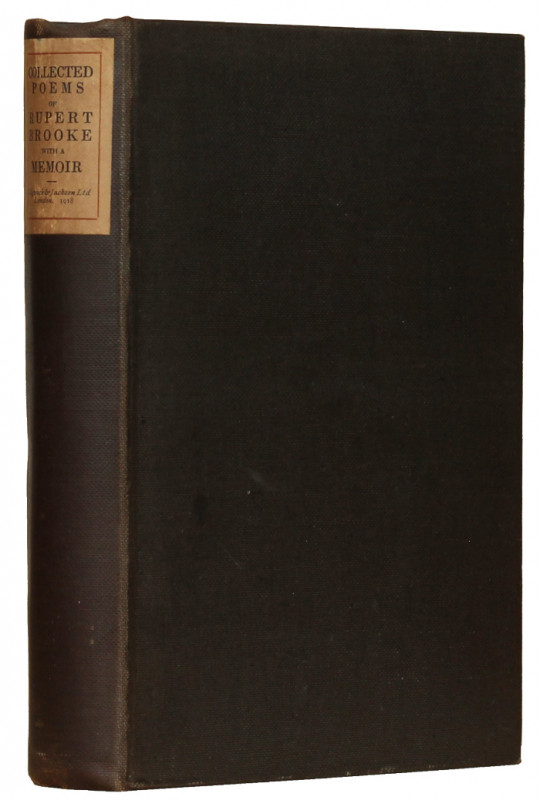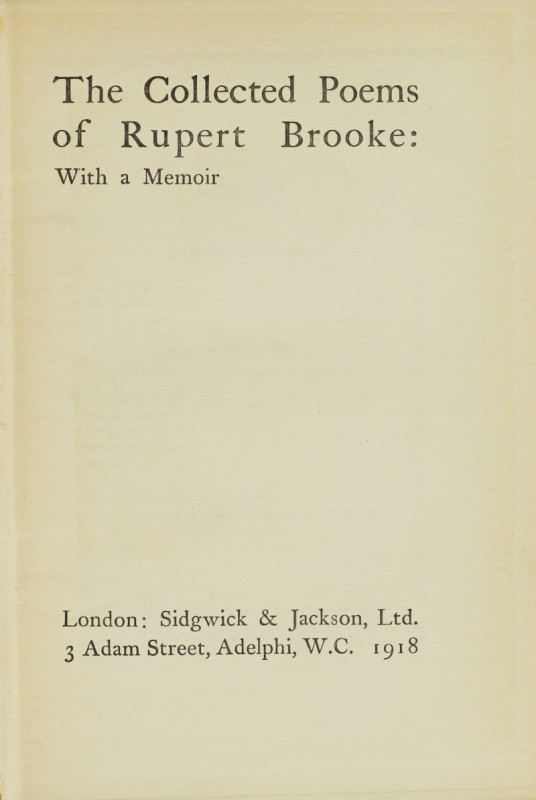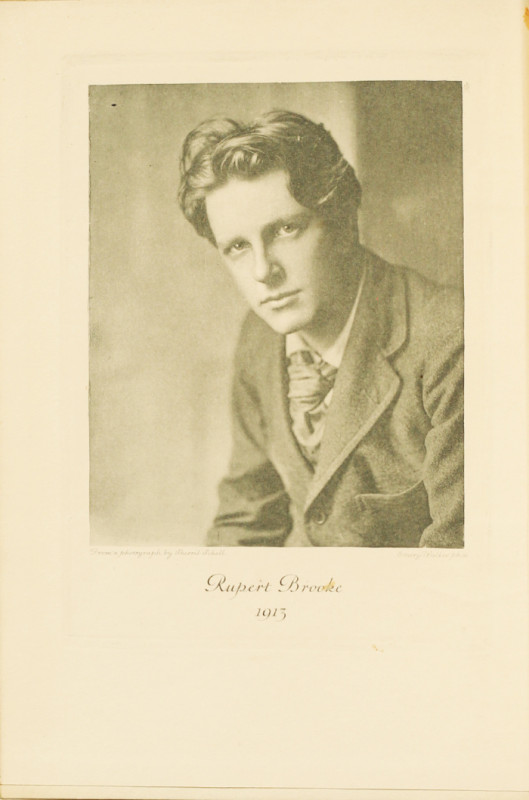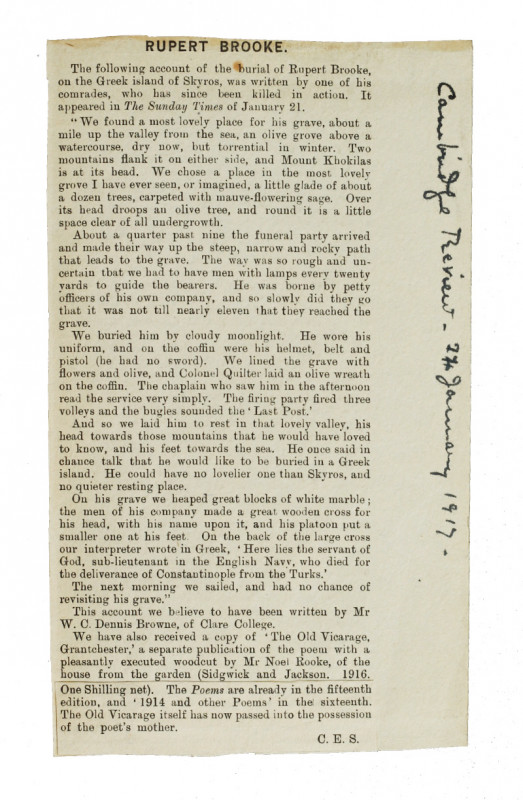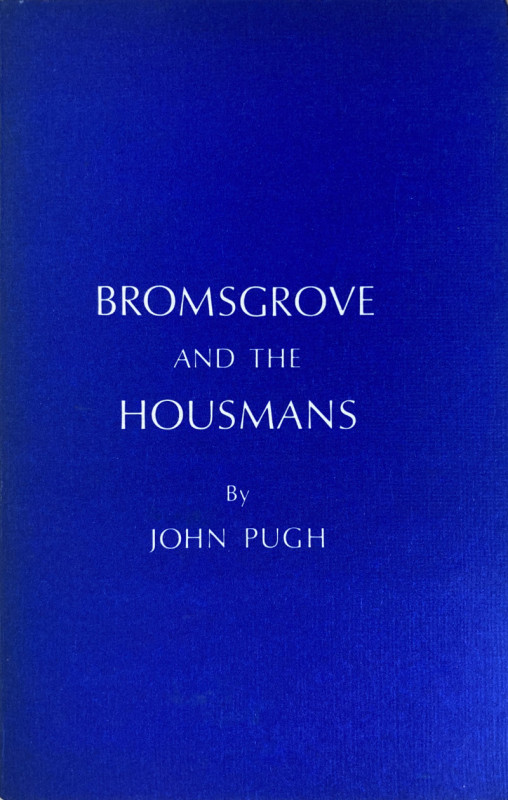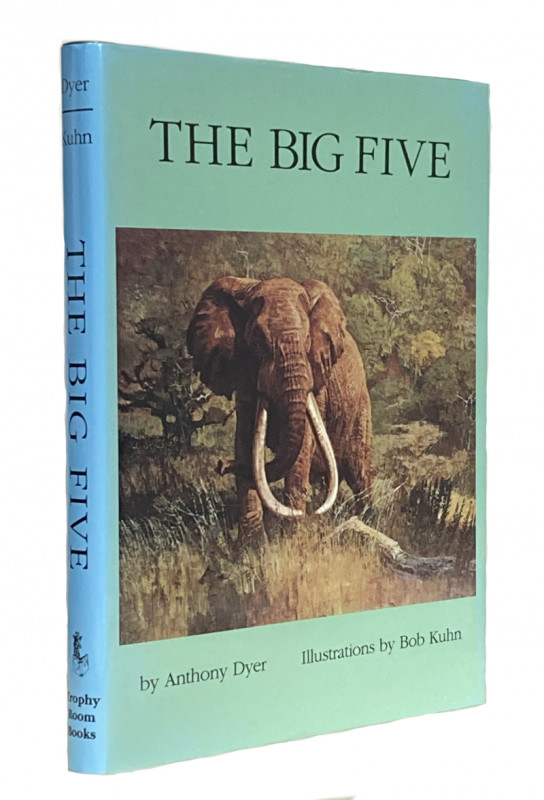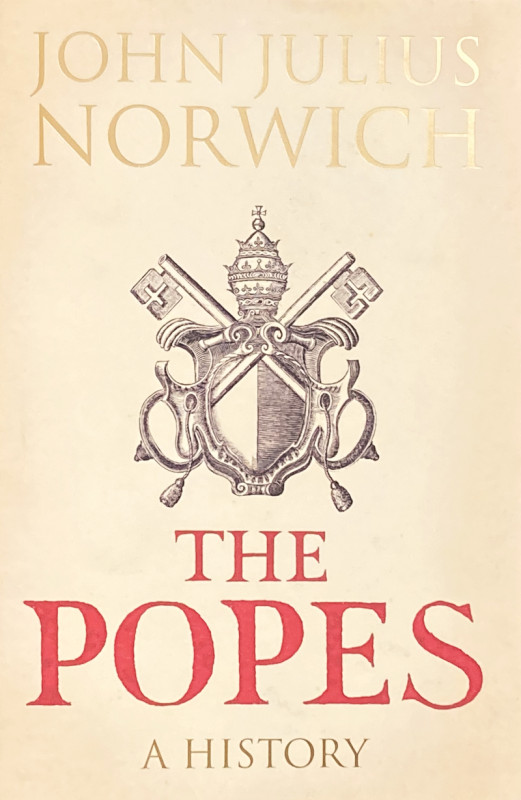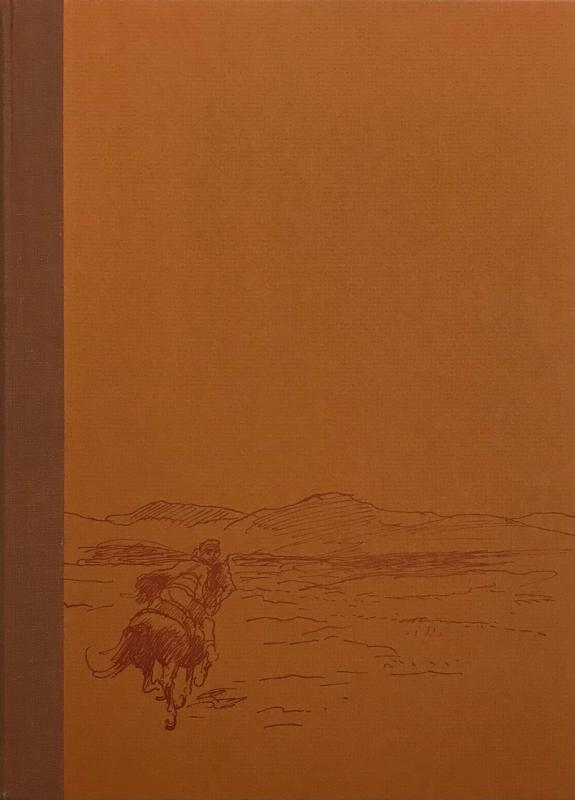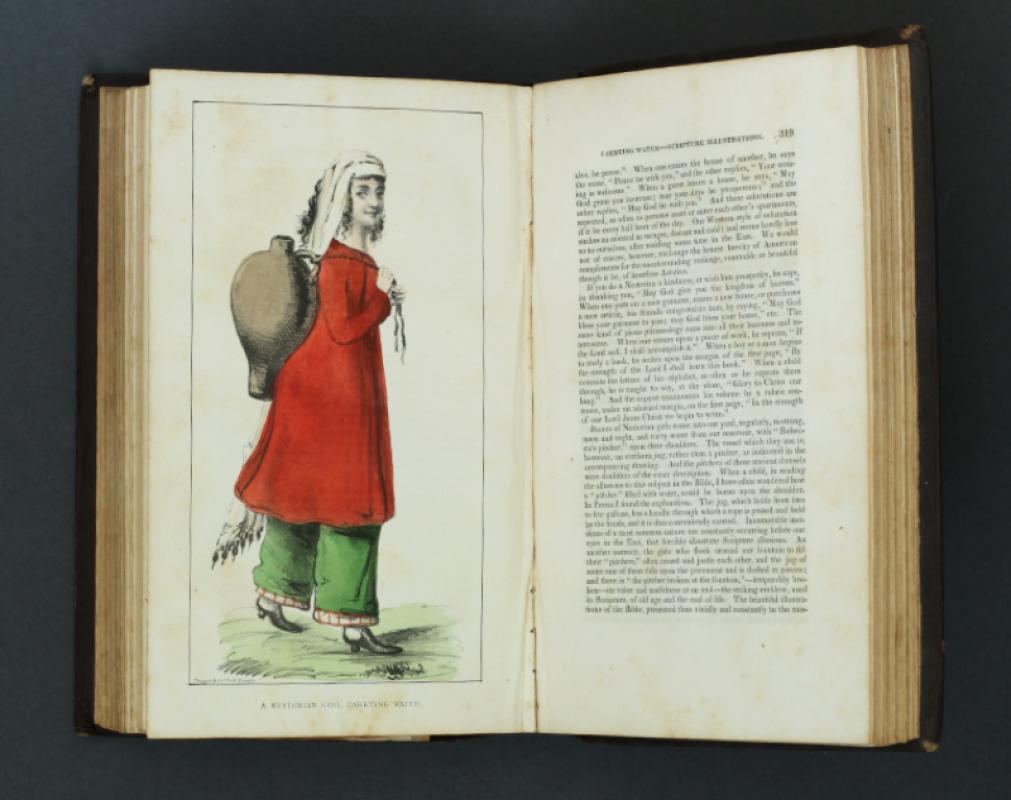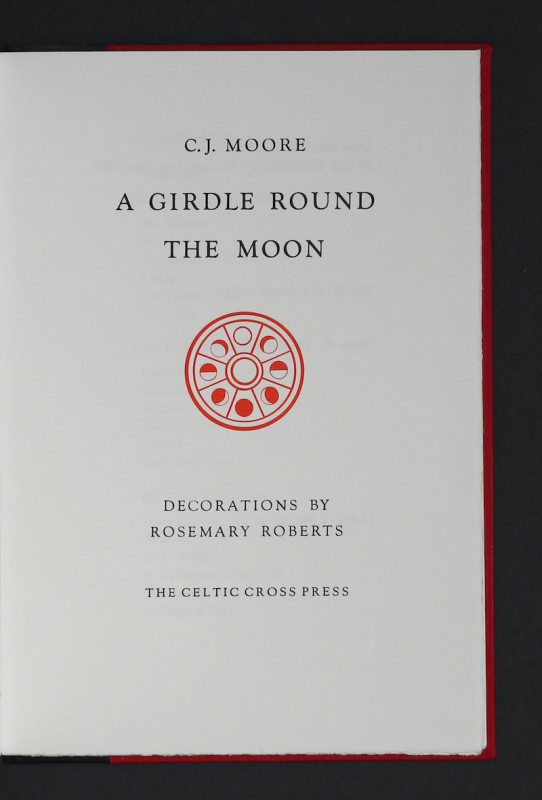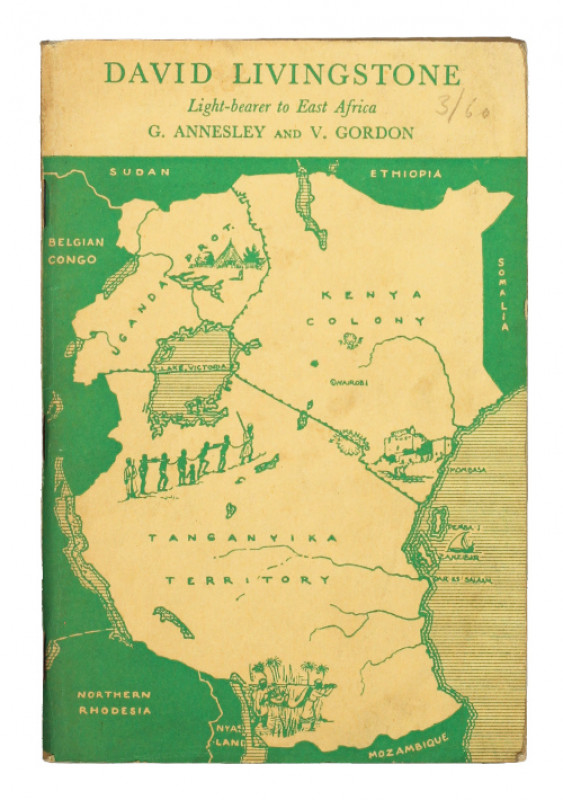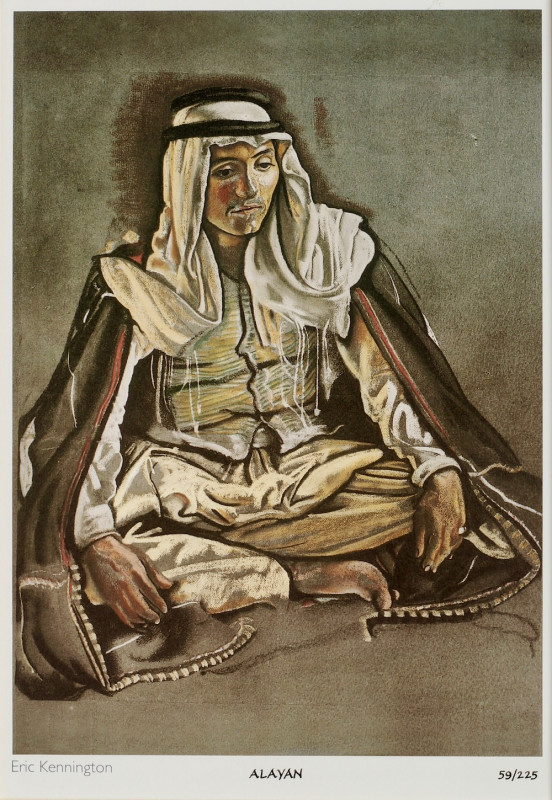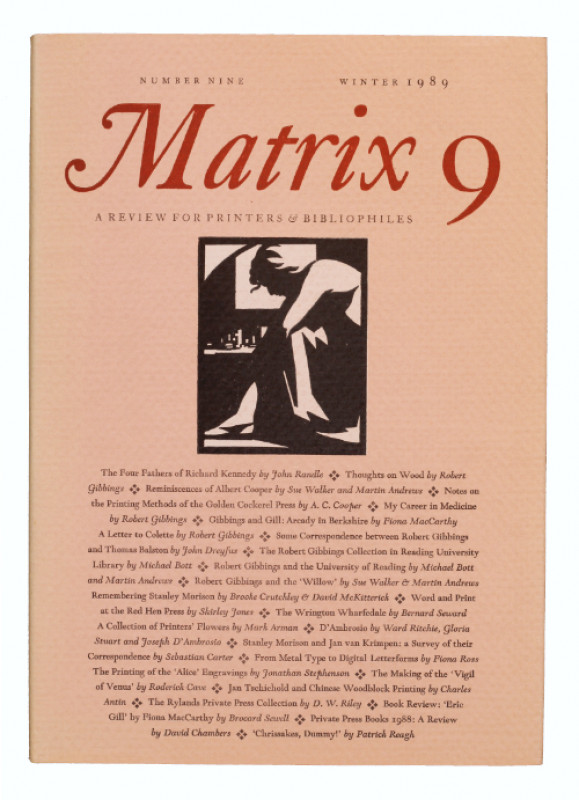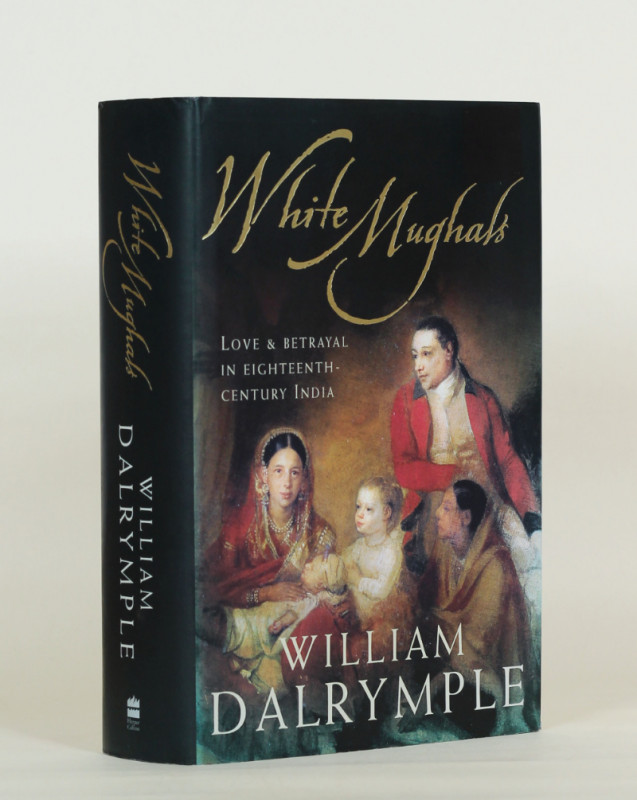The Collected Poems of Rupert Brooke: With a Memoir
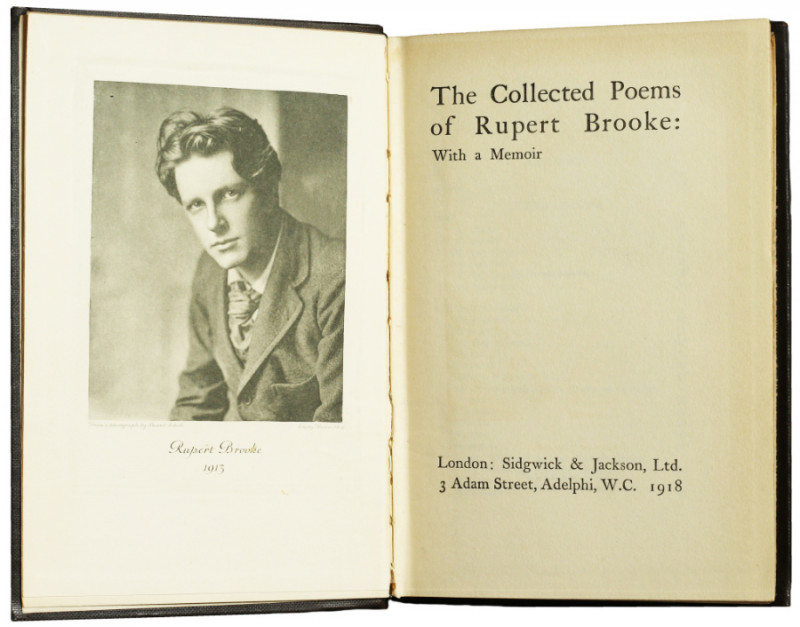
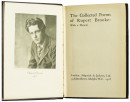




Book Description
FIRST BRITISH EDITION OF BROOKE’S COLLECTED POEMS, WITH A PRINTED ACCOUNT OF HIS BURIAL, POSSIBLY SENT BY MARY BROOKE TO HER SON’S FRIEND GEOFFREY KEYNES
Octavo (196 x 134mm), pp. cli, [1 (blank)], 160. Photogravure portrait frontispiece by Emery Walker after Sherril Schell and photogravure plate by Walker after Schell, both lacking tissue guards. (Very light offsetting onto title, some ll. slightly creased or chipped at edges.) Original black buckram, printed paper spine-label with red frame, spare spine label tipped onto rear free endpaper, top edges stained black, other edges trimmed, a few ll. unopened. (Spine slightly leant and label slightly darkened, extremities slightly rubbed and bumped.) A very good copy.
Provenance: [?Sir Geoffrey Langdon Keynes FRCP, FRCS, FRCOG, FBA (1887-1982; by descent to his son:)] – Stephen John Keynes OBE, FLS (1927-2017).
Octavo (196 x 134mm), pp. cli, [1 (blank)], 160. Photogravure portrait frontispiece by Emery Walker after Sherril Schell and photogravure plate by Walker after Schell, both lacking tissue guards. (Very light offsetting onto title, some ll. slightly creased or chipped at edges.) Original black buckram, printed paper spine-label with red frame, spare spine label tipped onto rear free endpaper, top edges stained black, other edges trimmed, a few ll. unopened. (Spine slightly leant and label slightly darkened, extremities slightly rubbed and bumped.) A very good copy.
Provenance: [?Sir Geoffrey Langdon Keynes FRCP, FRCS, FRCOG, FBA (1887-1982; by descent to his son:)] – Stephen John Keynes OBE, FLS (1927-2017).
Dealer Notes
First UK edition, including 24 previously uncollected pieces. Poems, published by Sidgwick & Jackson at London in 1911 was the only collection of Brooke’s poems to be published before his death at sea from septicaemia on 23 April 1915. A second collection, 1914 and Other Poems, was edited and seen through the presses by Brooke’s friend and literary executor Sir Edward Marsh, and enjoyed great success and numerous reprints, and the international interest in Brooke’s poems led to the publication, with the agreement of Brooke’s publishers Sidgwick & Jackson, of The Collected Poems of Rupert Brooke with an Introduction by George Edward Woodberry and a Biographical Note by Margaret Lavington by the John Lane Company at New York in 1915. However, the American edition of The Collected Poems of Rupert Brooke ‘includes only the poems printed [in the two collections published] in 1911 and 1915’ (Keynes, A Bibliography of Rupert Brooke, p. 45), and the present British edition, which was edited by Marsh, adds 24 new pieces to the poems published in Poems and 1914 and Other Poems. Marsh’s Collected Poems is prefaced by an ‘Introduction’ by the poet’s mother, Mary Ruth Brooke (who was the only member of the poet’s immediate family to survive World War I), and Marsh’s substantial ‘Memoir’ of Rupert Brooke (pp. xi-cli). This first edition comprised 3,200 copies and, as Keynes notes, 16 impressions were printed between 1918 and 1928.
This copy is from the library of the noted bibliophile and collector Stephen Keynes, and it is seems likely that he inherited it from his father Sir Geoffrey Keynes, who had been a friend of Rupert Brooke since their schooldays. Both boys had entered Rugby School in September 1901 at the age of fourteen, and Keynes soon ‘began to fall under the spell of Rupert Brooke, son of the housemaster. [...] Rupert, although a few months younger than I, was very much wiser and more clever, and he soon became the friend to whom I turned with complete confidence and admiration’ (G.L. Keynes, The Gates of Memory (Oxford, 1981), pp. 36-37). Brooke and Keynes were both awarded places at the University of Cambridge, and after graduating in 1909 Brooke moved to Grantchester, where he became the centre of a group which included Keynes and was dubbed the ‘Neo-Pagans’ by Virginia Woolf, who wrote that Brooke ‘was living at Grantchester; his feet were permanently bare; he disdained all tobacco and butcher’s meat; and he lived all day, and perhaps slept all night, in the open air’ and ‘[u]nder his influence the country near Cambridge was full of young men and women walking barefoot, sharing his passion for bathing and fish diet, disdaining book learning, and proclaiming that there was something deep and wonderful in the man who brought the milk and in the woman who watched the cows’ (quoted in H. Lee, Virginia Woolf (London, 1996), p. 293). Keynes spent a further year at Cambridge studying medicine, before moving to London in 1910 to continue his medical studies at St Bartholomew’s Hospital, and in the following years the two men only met occasionally, before Brooke embarked on a year of overseas travel in May 1913.
On the outbreak of World War I in August 1914, Keynes left his position as a senior house surgeon at St Bartholomew’s and was commissioned into the Royal Army Medical Corps with the rank of lieutenant. Keynes joined his unit at Woolwich on 16 August 1914, and ‘[o]n 18 August I chanced to meet Rupert Brooke near my rooms in Bloomsbury. He gazed at my uniform with envy and almost with despair. Like many other young men, he was having the greatest difficulty in deciding in what capacity he ought to serve’ (The Gates of Memory, pp. 124-125). Nonetheless, Brooke’s ‘difficulties were finally resolved through the good offices of Eddie Marsh and Winston Churchill. By the middle of September he had obtained a commission in the Naval Division (R.N.V.R.)’ (G.L. Keynes (ed.), The Letters of Rupert Brooke (London, 1968), p. [557]), and in October 1914 Brooke took part in the Antwerp Expedition, before returning with his division to England, where he composed his five ‘War Sonnets’. On 22 August 1914 Keynes’s unit left Woolwich for France, where he was assigned to a field hospital based in a requisitioned hotel at Versailles, before moving in February 1915 (the month that Brooke’s division sailed for Gallipoli) to an ambulance train, which was based at Boulogne. There ‘[o]n 27 April [1915], I had news of the death of Rupert Brooke three days earlier in the Aegean, and I became more aware of the fate of which was to kill the majority of the friends of my generation at Rugby and Cambridge’ (op. cit., p. 130).
After Rupert Brooke’s death, Keynes ‘continued to feel a special obligation to his mother, who until her death in 1931 treated me almost as a son’ (op. cit., p. 165), and her will named Keynes as one of the four literary executors who were to replace Marsh. In 1946 Keynes published his edition of The Poetical Works of Rupert Brooke (which added more than 20 poems to the corpus established by Marsh), which was followed by his Bibliography of Rupert Brooke in 1954 and The Letters of Rupert Brooke. Chosen and Edited by Geoffrey Keynes in 1968. Loosely inserted in this copy is an article by Charles Edward Sayle (1864-1924) – an Old Rugbeian who was Assistant Under-Librarian at Cambridge University Library, and had befriended both Brooke and Keynes when they were undergraduates – titled ‘Rupert Brooke’, excised from the Cambridge Review. The article reprints an ‘account of the burial of Rupert Brooke, on the Greek island of Skyros’, written by W.C. Denis Browne, a friend of Brooke at Rugby and Cambridge who had joined the Naval Division with Brooke, sailed with him to Gallipoli, and was at Brooke’s bedside during his final hours before taking part in his friend’s burial on the evening of his last day. Browne’s account (which had been published in the Sunday Times on 21 January 1917) is followed by a note on the separate publication of ‘The Old Vicarage, Grantchester’, illustrated with a woodcut by Noel Rooke, by Sidgwick & Jackson in 1916, and the 15th and 16th editions respectively of Poems and 1914 and Other Poems, before concluding with the sentence ‘[t]he Old Vicarage itself has now passed into the possession of the poet’s mother’.
The account by Browne reprinted here was taken from a letter he wrote to Mary Brooke shortly after the burial, and was printed across two pages of the Cambridge Review. The final three lines, which were on the second page, have been neatly cut out and glued to the lower margin of the first section, and the margin has then been annotated ‘Cambridge Review. 24 January 1917’ in a hand which shares a number of characteristics with Mary Brooke’s. It is possible, therefore, that Mary Brooke had excised this account from the Cambridge Review, docketed it, and sent it to Geoffrey Keynes in France, and that Keynes retained it as an account of Brooke’s burial written by their friend Browne and published by Sayle.
Keynes, A Bibliography of Rupert Brooke, 14; E. Sudduth, The Joseph M. Bruccoli Great War Collection, p. 29.
This copy is from the library of the noted bibliophile and collector Stephen Keynes, and it is seems likely that he inherited it from his father Sir Geoffrey Keynes, who had been a friend of Rupert Brooke since their schooldays. Both boys had entered Rugby School in September 1901 at the age of fourteen, and Keynes soon ‘began to fall under the spell of Rupert Brooke, son of the housemaster. [...] Rupert, although a few months younger than I, was very much wiser and more clever, and he soon became the friend to whom I turned with complete confidence and admiration’ (G.L. Keynes, The Gates of Memory (Oxford, 1981), pp. 36-37). Brooke and Keynes were both awarded places at the University of Cambridge, and after graduating in 1909 Brooke moved to Grantchester, where he became the centre of a group which included Keynes and was dubbed the ‘Neo-Pagans’ by Virginia Woolf, who wrote that Brooke ‘was living at Grantchester; his feet were permanently bare; he disdained all tobacco and butcher’s meat; and he lived all day, and perhaps slept all night, in the open air’ and ‘[u]nder his influence the country near Cambridge was full of young men and women walking barefoot, sharing his passion for bathing and fish diet, disdaining book learning, and proclaiming that there was something deep and wonderful in the man who brought the milk and in the woman who watched the cows’ (quoted in H. Lee, Virginia Woolf (London, 1996), p. 293). Keynes spent a further year at Cambridge studying medicine, before moving to London in 1910 to continue his medical studies at St Bartholomew’s Hospital, and in the following years the two men only met occasionally, before Brooke embarked on a year of overseas travel in May 1913.
On the outbreak of World War I in August 1914, Keynes left his position as a senior house surgeon at St Bartholomew’s and was commissioned into the Royal Army Medical Corps with the rank of lieutenant. Keynes joined his unit at Woolwich on 16 August 1914, and ‘[o]n 18 August I chanced to meet Rupert Brooke near my rooms in Bloomsbury. He gazed at my uniform with envy and almost with despair. Like many other young men, he was having the greatest difficulty in deciding in what capacity he ought to serve’ (The Gates of Memory, pp. 124-125). Nonetheless, Brooke’s ‘difficulties were finally resolved through the good offices of Eddie Marsh and Winston Churchill. By the middle of September he had obtained a commission in the Naval Division (R.N.V.R.)’ (G.L. Keynes (ed.), The Letters of Rupert Brooke (London, 1968), p. [557]), and in October 1914 Brooke took part in the Antwerp Expedition, before returning with his division to England, where he composed his five ‘War Sonnets’. On 22 August 1914 Keynes’s unit left Woolwich for France, where he was assigned to a field hospital based in a requisitioned hotel at Versailles, before moving in February 1915 (the month that Brooke’s division sailed for Gallipoli) to an ambulance train, which was based at Boulogne. There ‘[o]n 27 April [1915], I had news of the death of Rupert Brooke three days earlier in the Aegean, and I became more aware of the fate of which was to kill the majority of the friends of my generation at Rugby and Cambridge’ (op. cit., p. 130).
After Rupert Brooke’s death, Keynes ‘continued to feel a special obligation to his mother, who until her death in 1931 treated me almost as a son’ (op. cit., p. 165), and her will named Keynes as one of the four literary executors who were to replace Marsh. In 1946 Keynes published his edition of The Poetical Works of Rupert Brooke (which added more than 20 poems to the corpus established by Marsh), which was followed by his Bibliography of Rupert Brooke in 1954 and The Letters of Rupert Brooke. Chosen and Edited by Geoffrey Keynes in 1968. Loosely inserted in this copy is an article by Charles Edward Sayle (1864-1924) – an Old Rugbeian who was Assistant Under-Librarian at Cambridge University Library, and had befriended both Brooke and Keynes when they were undergraduates – titled ‘Rupert Brooke’, excised from the Cambridge Review. The article reprints an ‘account of the burial of Rupert Brooke, on the Greek island of Skyros’, written by W.C. Denis Browne, a friend of Brooke at Rugby and Cambridge who had joined the Naval Division with Brooke, sailed with him to Gallipoli, and was at Brooke’s bedside during his final hours before taking part in his friend’s burial on the evening of his last day. Browne’s account (which had been published in the Sunday Times on 21 January 1917) is followed by a note on the separate publication of ‘The Old Vicarage, Grantchester’, illustrated with a woodcut by Noel Rooke, by Sidgwick & Jackson in 1916, and the 15th and 16th editions respectively of Poems and 1914 and Other Poems, before concluding with the sentence ‘[t]he Old Vicarage itself has now passed into the possession of the poet’s mother’.
The account by Browne reprinted here was taken from a letter he wrote to Mary Brooke shortly after the burial, and was printed across two pages of the Cambridge Review. The final three lines, which were on the second page, have been neatly cut out and glued to the lower margin of the first section, and the margin has then been annotated ‘Cambridge Review. 24 January 1917’ in a hand which shares a number of characteristics with Mary Brooke’s. It is possible, therefore, that Mary Brooke had excised this account from the Cambridge Review, docketed it, and sent it to Geoffrey Keynes in France, and that Keynes retained it as an account of Brooke’s burial written by their friend Browne and published by Sayle.
Keynes, A Bibliography of Rupert Brooke, 14; E. Sudduth, The Joseph M. Bruccoli Great War Collection, p. 29.
Author
BROOKE, Rupert Chawner
Date
1918
Publisher
London: Turnbull & Spears for Sidgwick & Jackson, Ltd.
Friends of the PBFA
For £10 get free entry to our fairs, updates from the PBFA and more.
Please email info@pbfa.org for more information
